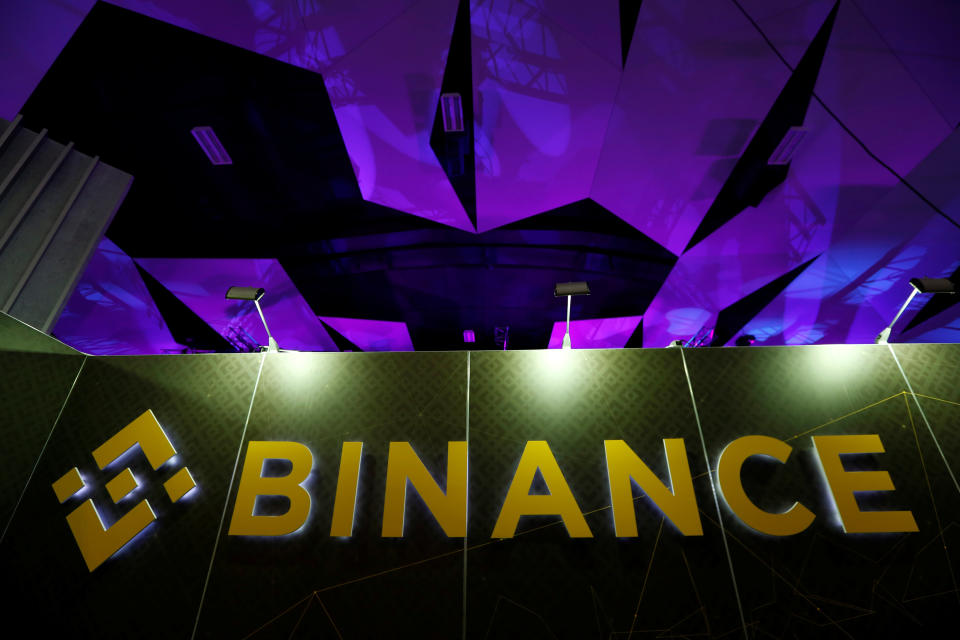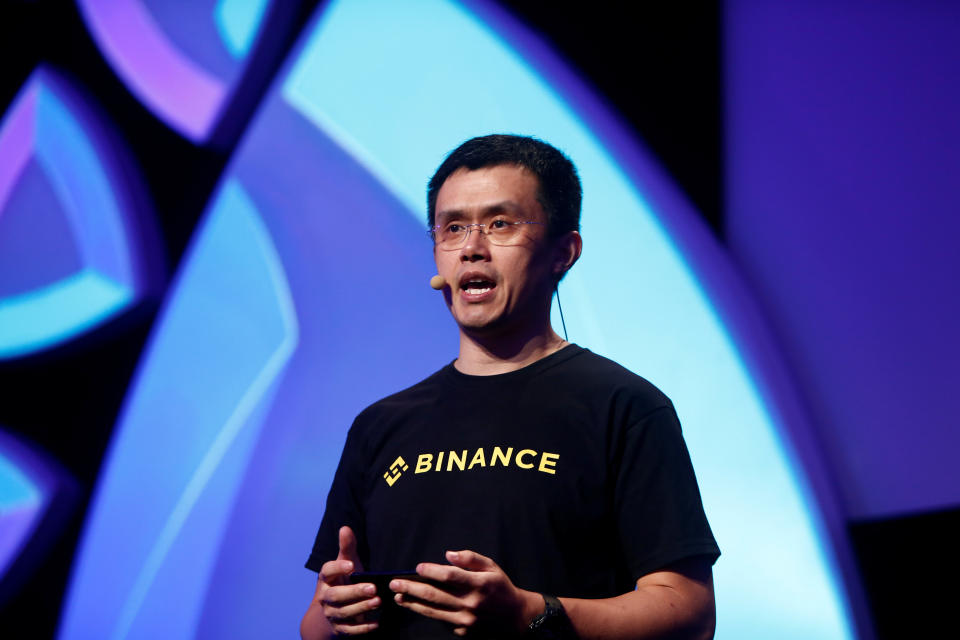CFO of $1bn crypto exchange on Facebook's blockchain plans: 'Their goal is to wall off other people'

Wei Zhou, the CFO of Binance, one of the world’s biggest cryptocurrency exchanges, isn’t excited about Facebook’s closely watched blockchain experiments.
“I suspect it’s going to be a closed Facebook ecosystem,” Zhou told Yahoo Finance UK. “Their goal is to wall off other people from coming into their system, their goal is not to open up their system to other people.”
Facebook publicly announced in March it had formed a blockchain research group with over 60 staff working on the technology.
What exactly they’re up to is a closely guarded secret, but there is speculation the social media giant could launch its own cryptocurrency. Whatever Facebook’s plan, Zhou is sceptical as long as CEO Mark Zuckerberg is at the helm.
“One of the key things that we’ve seen is that the blowback against Facebook is it’s not a community driven organisation,” he said. “Key decisions are made by one person.”
“The thesis behind [crypto] tokens in general, the blockchain in general — it’s an open system where anyone can use it if they spend the time to adopt the technology.”
READ MORE: Crypto price crash actually good for business, say entrepreneurs
Zhou sat down with Yahoo Finance UK at the Paris Blockchain Week summit to talk about Facebook, Binance’s growth plans, the crypto bear market, and why he thinks almost all big corporations will have some form of token in the future.
His comments are significant given that Zhou sits atop one of the most successful global tech startups that has emerged in recent years — crypto or otherwise.
‘It’s about increasing more access points’

Binance was only founded in 2017, but it has quickly grown to be one of the world’s biggest cryptocurrency exchanges. The private company had estimated profits of close to $500m last year despite a collapse in crypto prices and trading volumes. It remains profitable even with the continued downturn — estimated quarterly profits were around $90m in the first quarter of 2019.
Zhou said he believes that Binance’s continued success means the company has a duty to help grow the sector as a whole.
“Our priority at the moment is basically how to help the ecosystem to grow: How do we grow the blockchain and cryptocurrency ecosystem,” he said.
Alongside operating Binance’s core exchange, which trades around $1bn daily, the company has recently invested in an Australian startup bringing bitcoin to travel, launched a Jersey-based subsidiary where people can buy bitcoin with British pounds or euros, and launched “Binance Lite” in Australia, which lets people buy bitcoin from local convenience stores.
READ MORE: Supercar rallies and nurseries on the blockchain: Remnants of crypto boom remain despite bear market
“It’s about increasing more access points,” Zhou said. “A lot of people say it, but you don’t know [about crypto] until you’ve done it and once you experience that freedom then I think more adoption will come.”
The company has also debuted “Launchpad,” a crypto crowdfunding platform based on the Binance exchange, and made a seed investment into a Malta-based bank that will accept crypto customers. One of the biggest barriers crypto startups face is traditional banks won’t touch them.
“We believe in blockchain as a whole and for that you need an ecosystem,” he said. “And for that you need a bank that will work with our industry.”
‘It’s taken a lot of the fluff out’

The industry is currently in the depths of what insiders have dubbed the “crypto winter.”
Bitcoin, the bellwether of the market, has recently shown some signs of revived interest, but still remains well below its 2018 high of close to $20,000. Trading activity also remains depressed.
“I don’t think it has changed much in terms of how we operate,” Zhou said. “We have actually become more focused on the projects that we’re doing.
He said the crash is actually “good for the market” as “it’s taken a lot of the fluff, the bubble, out of the marketplace so that people who remain continue to build and deliver quality services and will survive.”
This view was echoed by others at the conference who said the crypto winter was actually good for business.
Still, Zhou ultimately hopes for a revival in interest and activity. He said a “lack of certainty” from global regulators has contributed to the decline. Clear regulation was one reason why Binance relocated its headquarters from Hong Kong to the small island of Malta. (That, and a crackdown on crypto exchanges by China.)
“We see Malta as a place that has a really talented workforce,” Zhou said. “They’ve been able to embrace risk and make it compliant.”
‘We are not stakeholders anymore’
Talk of regulation brings the conversation back to Facebook.
“The technology of this industry will always run ahead of regulation as we’ve seen with the internet across the board: e-commerce, ride share, hotel share, social media,” Zhou said.
“Now regulation is catching up with social media as well, because those things have more ramifications on real lives and democracy and freedom than our industry to be quite honest.”
Zhou was Zuckerberg’s contemporary at Harvard University and estimates that he was among the first 2,000 people to sign up to the service that became Facebook when it was initially set up as a college networking website in 2004.
“I’m as much a part of that community and helped to contribute to that success as the shareholders that put money in it, as the engineers who worked on it — none of those people get representation,” Zhou said. “That’s why people are leaving. We’re not stakeholders in that business anymore.”
READ MORE: France pushes to become global hub for blockchain — the tech behind bitcoin
Zhou thinks blockchain and cryptocurrencies could help solve these issues by creating more decentralized systems that reward users rather than just owners.
“One of the projects we invested in is basically how do we compensate content creators through the token economics?” he said.
“As a viewer, as a creator, YouTube is taking all my money, Instagram is taking all my money. As an influencer I have to go hustle shaving cream or sweatshirts to make money — because Instagram is making all that money and they’re not giving me a dime. How do you balance that out? I think token is a good way to start.”
He doesn’t expect to see this type of innovation to come from Facebook.
“I don’t think it’s going to come from Facebook because I don’t think it’s in Zuckerberg’s DNA to let go,” he said. “The mindset is very clear from day one if you’ve read the book, watched the movie, see what he does. Even the way he lives — before he moved into the neighbourhood he bought every house in that neighbourhood.”
But Zhou does expect to see other companies embrace crypto.
”You’re going to have a lot more tokens in the world,” he said. “I think all consumer facing companies are to a certain extend going to have their own token.”
“Carrefour has put chicken and potatoes on the blockchain now. It’s real.”

 Yahoo Finance
Yahoo Finance 